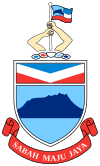Sabah State
| Sabah | |||
|---|---|---|---|
| State | |||
|
|||
| Nickname(s): Negeri Di Bawah Bayu Land Below the Wind |
|||
| Motto: Sabah Maju Jaya Let Sabah Prosper |
|||
| Anthem: Sabah Tanah Airku Sabah My Homeland |
|||
 |
|||
| Coordinates: 5°15′N 117°0′E / 5.250°N 117.000°ECoordinates: 5°15′N 117°0′E / 5.250°N 117.000°E | |||
| Capital | Kota Kinabalu | ||
| Divisions |
List
|
||
| Government | |||
| • Yang di-Pertua Negeri | Juhar Mahiruddin | ||
| • Chief Minister | Musa Aman (BN) | ||
| Area | |||
| • Total | 72,500 km2 (28,000 sq mi) | ||
| Population (2015) | |||
| • Total | 3,543,500 | ||
| • Density | 49/km2 (130/sq mi) | ||
| Demonym(s) | Sabahan | ||
| Human Development Index | |||
| • HDI (2010) | 0.643 (medium) (14th) | ||
| Time zone | MST (UTC+8) | ||
| Postal code | 88xxx to 91xxx | ||
| Calling code | 087 (Inner District) 088 (Kota Kinabalu & Kudat) 089 (Lahad Datu, Sandakan & Tawau) |
||
| ISO 3166 code | H (MY-12, 47–49) | ||
| Vehicle registration |
SA, SAA, SAB (West Coast) SB (Beaufort) SD (Lahad Datu) SK (Sabah State Government) SS (Sandakan) ST (Tawau) SU (Keningau) |
||
| Former name | North Borneo | ||
| Self-government | 31 August 1963 | ||
| Malaysia Agreement | 16 September 1963a | ||
| Website | Official website | ||
| a Despite the fact that the Federation of Malaysia only came into existence on 16 September 1963, 31 August is celebrated as the Independence day of Malaysia. Since 2010, 16 September is recognised as Malaysia Day, a patriotic national-level public holiday to commemorate the foundation of Federation of Malaysia that joined North Borneo (Sabah), Malaya, Sarawak and (previously) Singapore as states of equal partners in the federation. | |||
|
|
|
| Origin | Estimation (+) |
|---|---|
|
|
1,000,000 |
|
|
500,000 |
|
|
200,000 |
|
|
70,000 |
|
|
7,000 |
|
|
2,000 |
|
|
1,000 |
|
|
300 |
|
|
200 |
|
|
100 |
Sabah (Malay pronunciation: [saˈbah]) is one of the two East Malaysian states on the island of Borneo. It is situated in northern Borneo, bordering the state of Sarawak to the southwest, Kalimantan of Indonesia to the south, while separated by sea from the Federal Territory of Labuan. Sabah shares maritime borders with Vietnam in the west and the Philippines to the north and east. Kota Kinabalu is the capital city, the economic centre of the state and the seat of the Sabah state government. Other major towns in Sabah include Sandakan and Tawau. As of the 2015 census in Malaysia, the state's population is 3,543,500. Sabah has an equatorial climate with tropical rainforests and abundant animal and plant species. The state has long mountain ranges on the west side which form part of the Crocker Range National Park. Kinabatangan River, second longest river in Malaysia runs through Sabah and Mount Kinabalu is the highest point of Sabah as well as of Malaysia.
The earliest human settlement in Sabah can be traced back to 20,000–30,000 years ago along the Darvel Bay area at the Madai-Baturong caves. The state had a trading relationship with China from the 14th century AD. Sabah came under the influence of the Bruneian Empire in the 14th–15th century while the eastern part of the territory fell under the influence of Sultanate of Sulu between the 17th–18th centuries. The state was subsequently acquired by the British North Borneo Chartered Company in the 19th century. During World War II, Sabah was occupied by the Japanese for three years. It became a British Crown Colony in 1946. On 31 August 1963, Sabah was granted self-government by the British. Following this, Sabah became one of the founding members of the Federation of Malaysia (established on 16 September 1963) alongside Sarawak, Singapore (expelled in 1965), and the Federation of Malaya (Peninsular Malaysia or West Malaysia). The federation was opposed by neighbouring Indonesia, which led to the Indonesia–Malaysia confrontation over three years along with the threats of annexation by the Philippines, threats which continue to the present day.
...
Wikipedia


